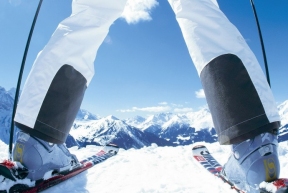
As the season gets underway and skiers of all levels journey to the snow capped mountains, chances are that a great many of them will do some things that won’t help their cause, says world-class ski instructor Chalky White. Due to the popularity of his Amazon, in-category, No.1 bestselling how-to book, “The 7 Secrets of Skiing,” Chalky was able to craft a new program for business professionals and celebrities called Ski the World with Chalky White, (www.the7secretsofskiing.com). Chalky reviews common mistakes skiers make on snow-capped slopes.
“I’m too old to be a great skier, so I’ll just wing it.” Some people are raised on the slopes, carving up the snow at age 6 and entering competitions at age 8. Most folks, however, have average natural ability and aren’t raised on skis. But, as I was they can, if accurately trained, become very competent skiers. If you’re completely new to skiing, take the time to learn some basics – preferably with a qualified instructor. The most important fundamental to learn is balance, as applied to skiing; all sports rely on balance to some extent, and for skiing it all starts there!
“I can be great if only I can overcome my fear.” Indeed, hurling one’s body down what they perceive to be a steep slope of slippery snow takes courage. It makes sense to have butterflies at the top of a slope, but overcoming nerves alone won’t make you great. Some skiers, even a few new to the sport, have little fear when skiing – but that’s often because they’ve practiced and have undergone sound training. The more adept you become as a skier, the more fear-based emotion is pushed to the “back-burner” and is, as practice continues, largely replaced by new-found confidence and more fun.
“I’m beyond the basics.” Ninety-five percent of skiers, including some professionals, do not fully appreciate and utilize the power of balance – at least not consciously. Many simply believe they are fully balanced, but this is often delusional and maybe arrogant thinking. The best advice is to be a constant student, which means consistent vigilance toward one’s balance. A great skier is one who can consistently recover following balance losses. You may be frustrated that you lost balance at all. However, the ability to recover with ease is a sign that you are well-balanced.











